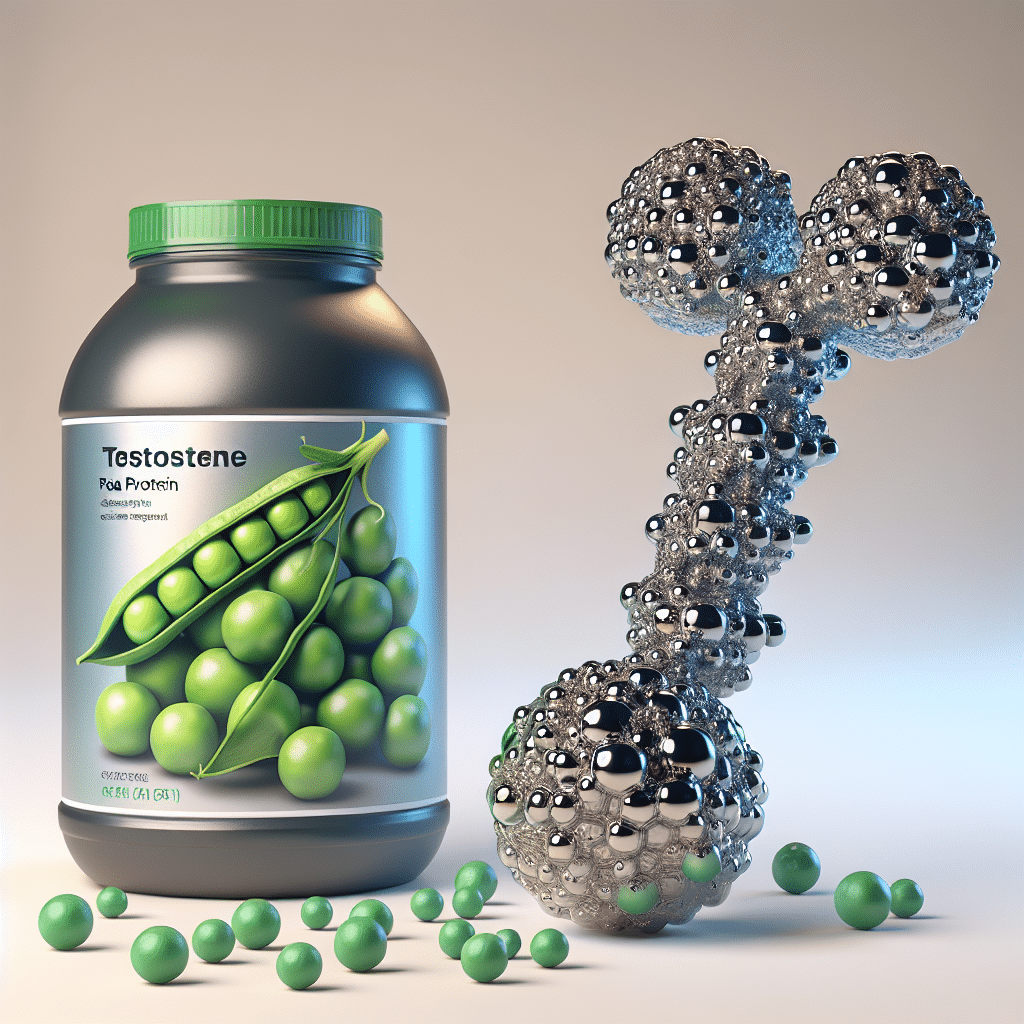Is pea protein bad for testosterone?
-
Table of Contents
- Pea Protein and Testosterone: Uncovering the Truth
- Understanding Testosterone and Its Importance
- Pea Protein: A Brief Overview
- The Myth of Plant Proteins and Testosterone
- Phytoestrogens and Hormonal Balance
- Scientific Research on Pea Protein and Testosterone
- Studies on Pea Protein Intake and Hormonal Effects
- Comparing Animal and Plant Protein Sources
- Case Studies and Anecdotal Evidence
- Additional Factors Affecting Testosterone
- Conclusion: Pea Protein and Testosterone Levels
- Recommendation: ETprotein’s Pea Protein Products
Pea Protein and Testosterone: Uncovering the Truth

With the rise of plant-based diets and the increasing popularity of vegan protein sources, pea protein has become a staple in many health-conscious individuals’ diets. However, there’s been a growing concern among men regarding the impact of plant proteins, like pea protein, on testosterone levels. This article delves into the scientific evidence to address the question: Is pea protein bad for testosterone?
Understanding Testosterone and Its Importance
Testosterone is a crucial hormone in the human body, especially for men. It plays a vital role in muscle growth, fat distribution, bone density, and sex drive. Maintaining healthy testosterone levels is important for overall health and well-being.
Pea Protein: A Brief Overview
Pea protein is derived from yellow split peas and is a high-quality alternative to animal-based proteins. It’s rich in essential amino acids and is considered a complete protein, making it a favored choice for those on plant-based diets.
The Myth of Plant Proteins and Testosterone
There’s a common misconception that plant proteins, such as pea protein, can negatively affect testosterone levels due to their phytoestrogen content. Phytoestrogens are plant-derived compounds that can mimic the hormone estrogen in the body.
Phytoestrogens and Hormonal Balance
While it’s true that phytoestrogens can bind to estrogen receptors, the impact on testosterone levels is not as straightforward. The effects of phytoestrogens on the human body are complex and can vary depending on the individual’s overall health and hormonal balance.
Scientific Research on Pea Protein and Testosterone
To understand the relationship between pea protein and testosterone, it’s essential to look at the available scientific research.
Studies on Pea Protein Intake and Hormonal Effects
Several studies have investigated the impact of pea protein on hormone levels, including testosterone. The majority of this research indicates that pea protein does not have a negative effect on testosterone levels. In fact, some studies suggest that plant-based proteins may support healthy hormone balance.
Comparing Animal and Plant Protein Sources
Research comparing the effects of animal and plant protein sources on testosterone levels has shown no significant difference in hormonal responses. This suggests that pea protein is as effective as animal-based proteins in maintaining testosterone levels.
Case Studies and Anecdotal Evidence
While scientific studies are crucial, anecdotal evidence and case studies also provide insight into the effects of pea protein on testosterone. Many athletes and fitness enthusiasts who consume pea protein report no adverse effects on their testosterone levels or performance.
Additional Factors Affecting Testosterone
It’s important to note that testosterone levels can be influenced by various factors beyond diet, including:
- Age
- Physical activity levels
- Stress
- Sleep quality
- Overall health
Considering these factors is essential when evaluating the impact of pea protein on testosterone.
Conclusion: Pea Protein and Testosterone Levels
In conclusion, the current body of scientific evidence does not support the claim that pea protein is bad for testosterone. On the contrary, pea protein appears to be a viable and healthful protein source that can be included in a balanced diet without negatively impacting testosterone levels.
Recommendation: ETprotein’s Pea Protein Products
If you’re looking for a high-quality pea protein source, ETprotein offers a range of organic and non-GMO pea protein products. Their pea protein is allergen-free and characterized by a neutral taste, making it an excellent choice for various dietary needs.
About ETprotein:
ETprotein, a reputable protein and L-(+)-Ergothioneine (EGT) Chinese factory manufacturer and supplier, is renowned for producing, stocking, exporting, and delivering the highest quality organic bulk vegan proteins and L-(+)-Ergothioneine. They include Organic rice protein, clear rice protein, pea protein, clear pea protein, watermelon seed protein, pumpkin seed protein, sunflower seed protein, mung bean protein, peanut protein, and L-(+)-Ergothioneine EGT Pharmaceutical grade, L-(+)-Ergothioneine EGT food grade, L-(+)-Ergothioneine EGT cosmetic grade, L-(+)-Ergothioneine EGT reference grade and L-(+)-Ergothioneine EGT standard. Their offerings, characterized by a neutral taste, non-GMO, allergen-free attributes, with L-(+)-Ergothioneine purity over 98%, 99%, cater to a diverse range of industries. They serve nutraceutical, pharmaceutical, cosmeceutical, veterinary, as well as food and beverage finished product distributors, traders, and manufacturers across Europe, USA, Canada, Australia, Thailand, Japan, Korea, Brazil, and Chile, among others.
ETprotein specialization includes exporting and delivering tailor-made protein powder and finished nutritional supplements. Their extensive product range covers sectors like Food and Beverage, Sports Nutrition, Weight Management, Dietary Supplements, Health and Wellness Products, and Infant Formula, ensuring comprehensive solutions to meet all your protein needs.
As a trusted company by leading global food and beverage brands and Fortune 500 companies, ETprotein reinforces China’s reputation in the global arena. For more information or to sample their products, please contact them and email sales(at)ETprotein.com today.














